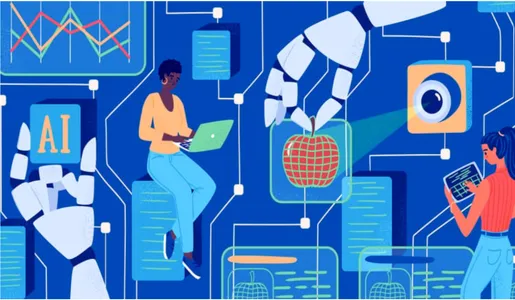Artificial intelligence (AI) is quickly reshaping how businesses operate. From startups to global corporations, firms are increasingly adopting AI to optimize processes, improve customer satisfaction, and foster innovation. A recent survey shows that 72% of companies have already incorporated AI to enhance efficiency and boost productivity.
Here’s why AI is essential for every company.
Cost Reduction and Efficiency
AI drastically lowers operational expenses. A McKinsey report indicates that firms utilizing AI in their human resources (HR) departments experience significant cost savings. Automating repetitive tasks like hiring and onboarding leads to substantial efficiency gains. AI tools can filter resumes, arrange interviews, and address employee inquiries, allowing HR teams to focus on strategic initiatives.
In supply chain management, AI enhances inventory management and demand forecasting. This precision reduces excess inventory costs and prevents stockouts, ensuring products are available when needed. McKinsey reports that companies using AI in supply chains have seen revenue grow by over 5%.
Enhancing Customer Experience
Today’s consumers demand personalized experiences, and AI delivers this at scale. By analyzing customer data, AI can offer tailored recommendations, customized marketing, and individualized service. According to Adobe, nearly 75% of consumers desire better personalization from businesses, with AI playing a crucial role in meeting this expectation.
AI-powered chatbots and virtual assistants provide round-the-clock customer support, responding to inquiries instantly. This improves customer satisfaction while reducing the workload on human service agents. Additionally, AI analyzes customer feedback to identify improvement areas, continuously enhancing the customer experience.
Driving Innovation
AI accelerates innovation by enabling swift and accurate data analysis. This data-driven strategy helps companies uncover new opportunities and make well-informed decisions. For example, generative AI can design new products, refine existing ones, and even create marketing content. Companies like Adobe are leveraging AI to produce custom images and graphics, streamlining creative processes and speeding up time-to-market.
In healthcare, AI tools analyze medical images and patient data to assist in diagnosing diseases and recommending treatments. This not only enhances patient outcomes but also eases the burden on healthcare professionals. AI’s capability to process large datasets quickly makes it invaluable for research and development across industries.
In the sales industry, various revenue intelligence platforms like MeetRecord are recording sales calls, analyzing and providing actionable insights that are helping sales teams to ensure that they have a good forecast about the deals. Also these tools help in personalized coaching to the sales representatives.
Boosting Productivity
AI boosts productivity by automating routine tasks and augmenting human capabilities. In software development, AI tools like code generators and debuggers help developers code more efficiently, leading to faster development cycles and shorter time-to-market for new features.
A Capgemini report shows that businesses integrating AI into their workflows experience significant productivity improvements. AI-driven analytics provide insights that help teams make better decisions and streamline operations. By automating repetitive tasks, AI allows employees to concentrate on higher-value work that requires creativity and critical thinking. By 2024, AI is expected to be integral to decision-making processes in 90% of companies. To equip your employees with AI skills and maximize your AI strategy, consider enrolling in globally recognized AI certifications like the Certified Artificial Intelligence (AI) Expert™ and the Certified Artificial Intelligence (AI) Developer™ by the Blockchain Council.
Improving Security
With cyber threats becoming increasingly sophisticated, AI is crucial in bolstering cybersecurity. AI algorithms detect unusual network activity and identify potential threats before they cause damage. This proactive security approach protects sensitive data and ensures business continuity.
TechRadar reports that many IT leaders see AI as essential to their cybersecurity strategy. AI tools monitor networks in real-time, analyze threat patterns, and respond to incidents faster than traditional methods. This reduces the risk of data breaches and strengthens the organization’s overall security.
Meeting Regulatory Requirements
AI helps businesses comply with regulations by automating compliance processes and ensuring accuracy. For example, AI tools can monitor transactions for signs of fraud or money laundering, ensuring financial institutions meet legal requirements. In sectors like pharmaceuticals, AI tracks and documents compliance with safety and quality standards, minimizing the risk of regulatory fines.
Moreover, AI helps companies navigate complex regulations by offering insights into changing rules and their potential impact on operations. This proactive approach ensures that companies remain compliant and avoid costly disruptions.
Competitive Advantage
Embracing AI offers a competitive edge by enabling companies to innovate faster, adapt to market changes quickly, and deliver superior customer experiences. Companies that invest in AI are better equipped to capture market share and drive growth. For instance, retail companies use AI to optimize pricing, predict trends, and improve supply chain efficiency, gaining a significant edge over competitors using traditional methods.
A survey by Rackspace and VMware found that 67% of IT leaders plan to integrate generative AI into their processes by the end of 2024. This widespread adoption underscores AI’s importance in maintaining a competitive advantage in today’s business environment.
Overcoming Challenges
While AI offers clear benefits, companies must tackle certain challenges to maximize its potential. Issues like data privacy, AI bias, and the need for skilled talent are critical considerations. Businesses must establish strong governance frameworks for responsible AI use and invest in training programs to build the necessary skills within their workforce.
Despite these challenges, the benefits of AI far outweigh the drawbacks. Companies that successfully integrate AI are well-positioned to thrive in today’s fast-changing business landscape.
Conclusion
AI is no longer a futuristic idea; it’s a critical tool for businesses striving to stay competitive and grow. From cutting costs and enhancing customer experiences to driving innovation and improving security, AI’s benefits are vast. As more companies invest in AI, those that embrace this technology will lead their industries. The time to integrate AI is now, and those who do will enjoy the rewards for years to come.
Check out more AI tool.
Elevate Guest Experience with RoomGenie
🚀 Check out NewsGenie – Your AI consultant
